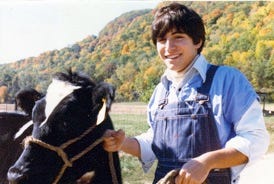Saw Was
My son caught the cold that has been circulating in the family, so he was up several times during the night. As a result, I woke several times too. This seems to have helped me remember a very strange dream I was having about midnight. I've been binge-watching Star Trek's Picard series (which I am liking better than had I expected). In any case, I was dreaming about some type of Vulcanesque school of philosophy that taught its students to see the other side of an issue. This sort-of morphed in my mind into a type of writing exercise, in which you would develop your own point and then devote an equal amount of effort to developing the opposing position. Not so much (or not only) to make your own argument stronger, but in the belief that a perspective opposite your own is probably equally valid.
This Vulcan philosophic tradition I was imagining in my dream for a while seemed to be tipping into Middle Earth as something they might teach at someplace like Rivendell. This led me (because it was a dream) to pondering the differences between Vulcans and Elves. And then the differences between Elves and Men in Tolkien (if Elros can choose to be a man and his brother Elrond an elf?) and Vulcans and Romulans in Star Trek (nature or nurture? epigenetics?). But then my thoughts returned to the idea of argumentative points and counterpoints and from there to the different forms these expressions could take. While one side of a position might be very well made with reasoned prose, the other side might call for poetry or a painting or a dance. Then I imagined one thought being expressed in a sonnet and the responding thought in a haiku.
Part of the point, at the beginning, was about training oneself to play both the parts in a conversation. To create a sort of dialog with an imagined other (here I'm reminded of Niklas Luhmann's claim that the zettelkasten was his conversation partner). Imagining the questions someone might ask as you made your case. Imagining the counterarguments or objections an antagonist would throw against your statements. Then, gradually, I started thinking about it as first a change over time, as I might take time to explore other elements of an idea; and then as a transition from thinking to being.
When I was dreaming about Star Trek, I imagined it as having a Vulcan (or even Klingon) sounding name that described a reversal of direction. Something like Kro-ork. A sort-of silly but very literal thing, which I could half imagine might be the type of thing the Trekkies would go for. My brain (I make no excuses, I was at least half asleep!) translated this to actual English words and came up with Saw and Was and it occurred to me these could stand for thinking and being. And then I asked myself, which came first?
This reminded me of an e.e. cummings poem that began, I think, "since feeling is first". But it also reminded me of a Hesse book I read when I was in high school. Published about a century ago, between the wars, it was a story of two friends. One, Narcissus, was a thinker in a monastery. His friend, Goldmund, was a woodworker and a lover. I was going to say, guess which one I identified with? But the true answer would, I suppose, be both. At different times during my life. Apollo and Dionysius. But (again, because I was asleep) this all sort-of made sense to me and I could almost hear the two characters having a conversation toward the end of the story. In it, the wandering lover said, "I was so hard I never saw". In response, the monk admitted, "I saw so well, I never was."
Maybe the benefit of getting older is that, having swung to both the extremes at different periods of my life, I might now be able to try to blend them and do both at the same time. Not only in writing, but in life.


